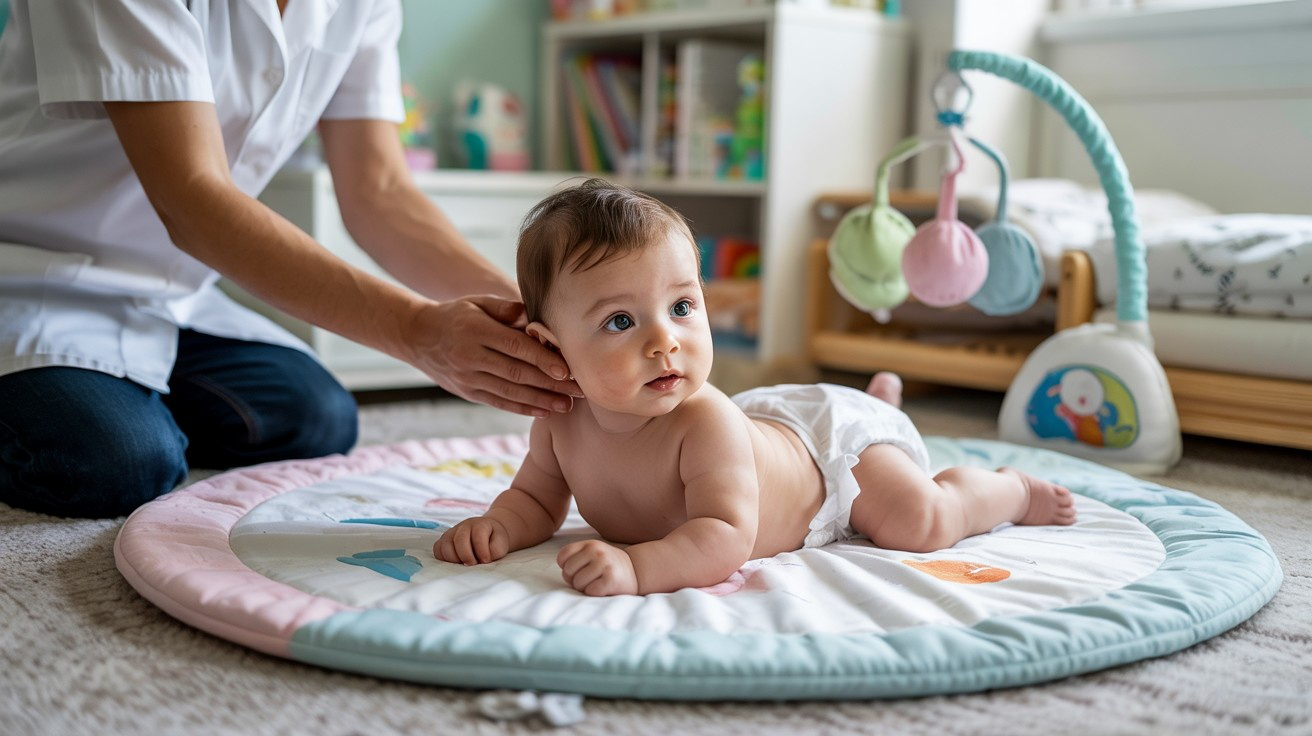
Those tiny fingers that once reflexively gripped yours are now beginning to intentionally reach out to the world. Welcome to week 7 of your parenting odyssey—a magical time when your baby’s personality emerges in earnest.
The sleepy newborn days are gradually giving way to a more alert, responsive little human who’s uncovering their body and environment with fresh curiosity each day.
Your baby is beginning to develop unique preferences and express themselves more clearly, and this shift brings both joy and new questions. This transition is happening at an astonishing pace, and it’s a thrilling time for both of you.
In this guide, we’ll explore everything from developmental milestones to feeding patterns, sleep strategies, and essential self-care tips to help you guide through this beautiful, challenging phase. You’ll find practical advice for these important weeks!
7-Week-Old Baby Development, Milestones, and Feeding
Your 7-week-old is developing rapidly! Their personality emerges through frequent smiles and coos as they become more alert and engaged with their surroundings. Their vision is improving, allowing them to focus on faces and track moving objects.
You’ll notice more genuine social smiles, especially when you speak to them. During tummy time, they may briefly hold their head up, strengthening important neck muscles. Their once-clenched hands gradually open as they locate their fingers.
Feeding patterns typically become more predictable now. Most babies take larger, less frequent feedings, consuming about 3-4 ounces every 3 hours (roughly 32 ounces daily). Watch for hunger cues like rooting, hand-to-mouth movements, and fussing.
Don’t force feed if your baby turns away—their body knows when they’re satisfied. Adequate wet diapers (6-8 daily) and steady weight gain are better indicators of sufficient nutrition than exact amounts consumed. Remember that each baby develops their own unique rhythm, though sleep patterns may still be inconsistent at this stage.
Common Ailments & Health Concerns

Parents often worry about common baby health issues, which is completely normal. Many concerns can be managed at home with simple steps, but if unusual symptoms persist, it’s always a good idea to consult a doctor.
Trust your instincts and know that seeking professional help when needed ensures your baby’s well-being, giving you peace of mind during these early parenting stages.
Flat Head Syndrome (Positional Plagiocephaly)
Flat head syndrome occurs when a baby’s skull flattens due to pressure in one position. Prevention includes repositioning the baby during sleep, tummy time, and limiting time in car seats. Most cases improve with movement, though severe ones may need helmet therapy.
Torticollis
- A condition where neck muscles contract, causing head tilt to one side
- Typically noticed in the first few months of life
- May contribute to flat spots as babies favor looking in one direction
- Treatment involves gentle stretching exercises demonstrated by healthcare providers
- Physical therapy is effective for most infants
Day-to-Day Care & Engagement

Your baby needs simple, loving care each day. Talk, sing, and touch gently to build your bond. Watch for signs that show when baby is ready to play or needs rest. Keep things simple – babies don’t need fancy toys or busy days. What matters most is your warm smile and gentle voice.
Baby Smiles—Reflex vs. Social
Early smiles happen by chance when babies sleep or pass gas. These reflex smiles are different from the true social smiles that begin around 6-8 weeks.
You’ll know a smile is genuinely social when the baby looks right at you while smiling, the smile appears after you talk or sing to them, their whole face lights up (not just the mouth), and they might accompany the smile with coos or happy wiggles.
Gentle Stimulation and Play
Babies need simple activities to develop physically and mentally. Their attention spans are very short, so brief play periods work best.
Try:
- Tummy time on a flat, firm surface for 3-5 minutes a few times daily
- Singing soft songs while gently rocking together
- Showing basic toys with contrasting colors
- Taking short walks outside for fresh air and new scenery
- Narrating your daily activities as you complete them
Remember that babies get tired quickly, so watch for signs that they’ve had enough stimulation.
Introducing Mirrors
Babies are naturally drawn to faces, including their reflection. A baby-safe mirror can provide fascination and learning opportunities. Position it where your baby can see during tummy time sessions.
Point to their reflection, enthusiastically saying, “That’s you!” Notice how intently they study the image and may attempt to touch it. Use mirrors during diaper changes to keep them engaged.
Parent Hack: “Keep a small basket of ‘diaper change distractions’ next to your changing station—include a baby-safe mirror, a high-contrast card, and a soft rattle. Rotate which item you offer to keep your wiggly baby engaged.”
Parent Tips and Self-Care

Prioritizing self-care is essential for new parents. Taking small moments for yourself helps manage stress and builds resilience during this demanding phase.
Remember that caring for your own well-being isn’t selfish—it’s necessary to be the best parent you can be.
Self-care strategies to consider:
- Take short breaks when your baby is sleeping
- Accept help from friends and family when offered
- Stay hydrated and keep nutritious snacks handy
- Set realistic expectations for yourself
- Connect with other parents for support and perspective
Keep a Journal or Memory Book
Documenting your baby’s development helps preserve precious memories that easily fade during sleep-deprived days. Choose the format that works best for your lifestyle. Traditional scrapbooks with photos and handwritten notes offer a tactile keepsake.
Simple notebooks with quick jotted observations are low-pressure alternatives. Digital apps that integrate photos and milestone tracking provide convenience for tech-savvy parents.
Staying Active
Physical activity benefits both your body and mind during the postpartum period. Begin with gentle, approved exercises like neighborhood walks with your baby.
Consider joining stroller fitness classes where you can exercise with your baby. Even 10-15 minutes of movement daily provides significant benefits. Regular activity releases mood-boosting endorphins and helps restore energy levels.
Considering Birth Control Options
Planning for your reproductive health is important during this transitional time. While breastfeeding may delay ovulation, it isn’t reliable contraception.
Options range from hormonal methods to non-hormonal choices. Schedule a postpartum check-up to discuss which method best fits your needs.
Essential Products & Tools

Preparing for your baby requires a thoughtful selection of practical items that support both infant development and parental comfort. From safe sleeping arrangements to versatile feeding tools, the right products can make early parenthood smoother.
Prioritize safety, functionality, and comfort when choosing essentials for your newborn’s first few months!
Baby Monitor
- Allows checking on your sleeping infant without entering the room
- Audio-only versions transmit sounds, while video monitors show visuals
- Consider range capabilities and battery life when selecting a model
- Some advanced monitors track breathing patterns and sleep quality
- Provides valuable peace of mind, especially for anxious new parents
Baby Memory Book
A baby memory book creates a tangible record of your child’s first year milestones. These keepsakes preserve memories that might otherwise fade with time, from first smiles to first steps.
You can record monthly growth measurements, developmental achievements, and special family moments and celebrations. Whether digital or physical, preserving these fleeting moments becomes a treasure for both you and your child to look back on in years to come.
Baby Mobile
Baby mobiles engage your infant’s developing vision by providing moving objects to track and focus on. Hanging above the crib or changing table, they entertain while encouraging visual development.
Select mobiles with contrasting colors and varied shapes to maximize visual stimulation and cognitive benefits. As your baby’s vision develops, they will enjoy the gentle movement and interesting patterns that mobiles provide.
Final Insights
The seventh week marks a beautiful transition in your parenting trip—a time when those fleeting newborn days begin changing into a more interactive relationship with your increasingly alert little one.
This is a time of wonderful change, as your baby becomes more aware of its surroundings and begins to express itself in new ways.
While the challenges of unpredictable sleep and feeding patterns continue, they are now balanced by rewarding social smiles, stronger neck muscles, and more purposeful movements. Every day brings a new milestone.
Remember that each baby develops at their own pace, and these guidelines are just that—guidelines, not strict timelines.
Trust your instincts, celebrate small victories, and know that the love and attention you’re giving now builds the foundation for your child’s future growth and happiness.
If you’re interested in more informational content on mothers and babies, feel free to click here and explore other blogs that you might enjoy.
